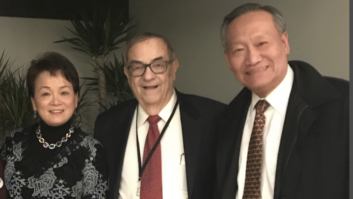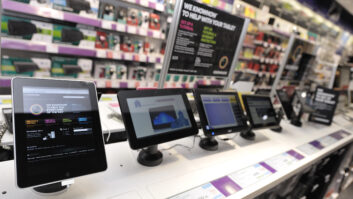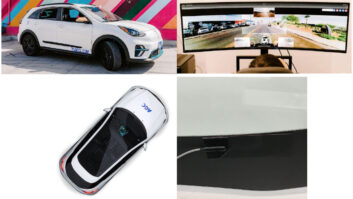Washington — The U.S. International Trade Commission (ITC) added a grandfather clause to limit the impact of its import ban on cellular phones and laptop modems whose Qualcomm-made chips are said to violate Broadcom patents. The industry’s main trade association and carrier Verizon Wireless, however, aren’t impressed.
The ITC will let suppliers and carriers continue to import CDMA 1x EV-DO and W-CDMA phones and laptop cards that have already been commercially available in the U.S. even if the models contain the Qualcomm chips. That’s good news for consumers because the majority of EV-DO and W-CDMA phone models already available in the U.S. contain the offending chipsets, according to carriers AT&T and Verizon.
Despite the grandfather clause, the CTIA trade association and Verizon roundly criticized the decision. The decision “unnecessarily decreases competition” and “denies millions of consumer’s access to innovative wireless broadband products,” CTIA said. The decision “could have the unintended effect of impairing the wireless industry’s efforts to improve communications in areas such as public safety,” CTIA added. A Verizon spokeswoman said the ruling will “freeze innovation” because carriers won’t be able to import “new innovative devices.”
The ITC previously determined that Qualcomm’s cellular baseband chips infringe five patent claims related to power conservation in cellular phones. The ban went into effect immediately and becomes permanent if the president does not overturn it within 60 days of June 7, an ITC spokeswoman told TWICE. During the 60-day period, suppliers and carriers can import new models with the offending chips by posting a bond, but the companies risk losing their bond if the ruling is allowed to stand, she said.
In the meantime, Verizon will join Qualcomm in asking the Federal Circuit Court of Appeals to stay enforcement of the order and asking the administration to override the decision. The commission “recognized the adverse impact of a downstream remedy to the public interest but decided on a measure that will limit consumer choice and access to mobile broadband services, be harmful to operators, manufacturers and the economy, and pose risks to public safety communications,” said Qualcomm CEO Paul Jacobs, Qualcomm is the chief supplier of baseband chipsets in EV-DO and W-CDMA handsets.
“The public injury that would result from the remedy imposed by the Commission is grossly disproportionate to any benefit flowing to Broadcom from such broad enforcement of a recently-purchased patent,” Qualcomm added in a written statement. “Broadcom does not make or sell EV-DO chips, and Broadcom’s claims that it can supply WCDMA products for the United States have been rebuffed by W-CDMA operators in submissions the operators made to the ITC,” the company complained in a written statement.
Qualcomm won’t have to appeal or suffer the impact of a ban, however, if it simply pays up, said David Dull, Broadcom’s senior VP and general counsel. “We simply want to be adequately compensated for the use of our intellectual property.” Broadcom, he said, is “open to discussions regarding the potential for licensing of our patent. The ball is in Qualcomm’s court.”
Qualcomm general counsel Louis Lupin, however, contended in a conference call that Broadcom’s terms would destroy Qualcomm’s business model.
Even if upheld, the ban will have limited impact, according to research company iSuppli. Analyst Tina Teng estimated that shipments of 4.2 million EV-DO and W-CDMA mobile phones would be affected in 2007, or only 4.4 percent of North American mobile-phone shipments in the second half of the year. Only 11 mobile-phone models would be covered by the ban in 2007, she said. The ban, however, will affect some handset suppliers more than others. They are Samsung, LG Electronics, and Motorola, in order of the suppliers most affected, iSuppli said.
In its decision,the ITC said its order “does bar the importation of new models of handheld wireless communications devices that contain Qualcomm’s infringing chips and chipsets” but that the “order ‘grandfathers’ models of handheld wireless communications devices being imported into the United States for sale to the general public on or before June 7, 2007.”
In further explaining its decision, the ITC said that “an order excluding all downstream products would impose great burdens on third parties, given the limited availability of alternative downstream products not containing the infringing chips.” The Commission also said that “barring importation of downstream products, with an exemption for certain previously imported models, will substantially reduce the burdens imposed on third parties while affording meaningful relief to the patent holder.”
ITC chairman Daniel Pearson disagreed, voting with one colleague against the action because an order exempting previously imported devices from the ban would still adversely affect the public interest, the ITC said.
Although the ITC decision grandfathers in current cellphone and PC Card models, the decision lacks a grandfather clause for Qualcomm’s importation of chips, chipsets and circuit boards that the company could use “to provide support to its customers for such essential services as designing next-generation mobile handsets or supporting the testing and debugging of handsets,” the ITC said. Qualcomm, however, could move such testing out of the country to circumvent the ban.
For its part, AT&T said only that it just received the decision and is “digesting it.” Added a spokesman, “We will be closely studying the ruling and considering all of our options.” The decision, he added, does not affect the launch of the iPhone because it is a GSM/EDGE-based phone that doesn’t incorporate the infringing chipset.
Qualcomm has already digested the decision and got indigestion. The action “will harm U.S. consumers, impact public safety and national security and harm the U.S. economy by stunting mobile broadband deployment,” the company stated unequivocally. On top of that, Qualcomm said it has worked with partners on affordable new phone designs that improve the performance and accuracy of cellphones’ GPS features in emergency situations.
The decision “also raises serious issues of due process and fairness,” the company said, because it punishes “completely innocent cellphone manufacturers and wireless operators that were given no opportunity to contest Broadcom’s infringement claims.”
The third parties “were not even permitted to appear in the infringement proceeding,” said Dr. Paul E. Jacobs, Qualcomm CEO. “We believe the Commission has not afforded manufacturers and operators, who will bear the brunt of this order, an adequate opportunity to defend their interests.”
The ban differs from the ban suggested by an ITC administrative law judge, who sought to ban the importation of the infringing phones without a grandfather clause but with exceptions for PDA-phones, QWERTY-keypad-equipped phones, and PC cards.













